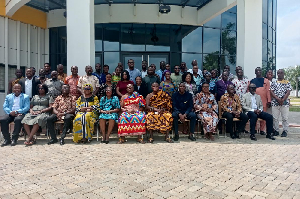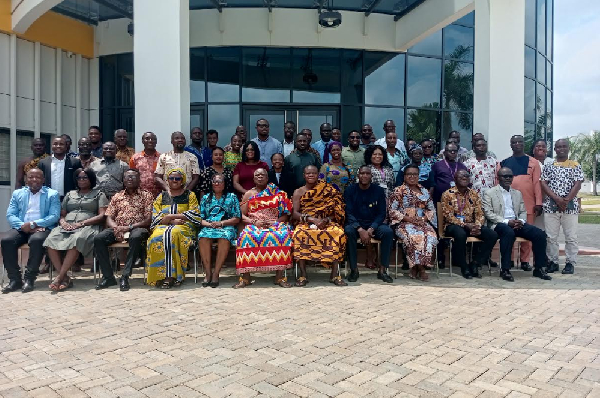 Participants of the stakeholders’ engagement pose for a photo
Participants of the stakeholders’ engagement pose for a photo
Considerable progress has been made in efforts to eradicate schistosomiasis from several endemic communities along the Volta Lake.
This achievement was revealed during a stakeholder engagement session held at Ensign Global University in Kpong, Eastern Region, where research findings on schistosomiasis control were shared.
A substantial number of affected individuals have been successfully treated—marking a significant step toward complete eradication of the disease.
The engagement brought together key stakeholders including traditional leaders, Members of Parliament, district health directors, Municipal and District Chief Executives (MCEs/DCEs).
The University of Health and Allied Sciences (UHAS), in partnership with the Volta River Authority (VRA) and the Ghana Health Service (GHS), conducted an implementation research project on schistosomiasis across six highly endemic districts in the Volta Basin. These include Asuogyaman in the Eastern Region; South Tongu, North Tongu, Central Tongu, and Kpando in the Volta Region; and Shai Osudoku and Ada East in the Greater Accra Region—all communities heavily exposed due to their proximity to the lake.
Dr. Alfred Kwesi Manyeh, Senior Research Fellow and Director of the Centre for Neglected Tropical Diseases Research at UHAS, highlighted the continued prevalence of the disease and outlined a strategic three-pronged approach to its control.
“The disease is still prevalent, but we can control it using two key strategies,” he said. “The first is the distribution of medication. The second is the provision of WASH [Water, Sanitation, and Hygiene] facilities, which local governments must implement based on research findings. These WASH interventions are crucial to stopping disease transmission.”
A baseline study revealed that regular exposure to the river, poor sanitation, limited access to medication, and behavioral patterns among residents contributed to the high prevalence of the disease.
A pre-treatment assessment conducted by the Volta River Authority showed a schistosomiasis prevalence rate of 40.53%, which dropped significantly to 4.66% following Mass Drug Administration (MDA) in collaboration with the Ghana Health Service.
The initiative also targeted improved collaboration with WASH stakeholders to provide sustainable infrastructure to combat schistosomiasis and other water-borne diseases.
Dr. Manyeh noted that the partnership led to a significant scale-up in MDA beneficiaries, growing from approximately 4,000 to nearly 20,000 individuals.
Elizabeth Maku Kisson, Principal Research Officer at the Environment and Sustainable Development Department of the VRA, emphasized the importance of strengthening collaboration with regional health directorates—specifically in the Oti, Volta, Eastern, and Greater Accra Regions.
She advocated for the expansion of the program to 17 districts and 400 communities, citing it as vital to long-term disease elimination.
“If we intensify mass drug administration and WASH interventions—like water supply and improved sanitation—the prevalence will keep dropping. But if we don’t sustain these gains, the prevalence will rise again,” she warned.
Kisson urged affected communities to limit contact with the lake and seek timely treatment when symptoms arise.
Schistosomiasis is one of the 21 neglected tropical diseases globally and is often referred to as a disease of poverty. Approximately 97% of infections and 85% of the global at-risk population are in low-income settings. Ghana’s national prevalence stands at 23.3%, with localized prevalence rates exceeding 50% in some areas.
More than 400 communities across 18 districts in eight regions within the Volta Basin are affected, placing over 3.1 million people at risk of infection.


